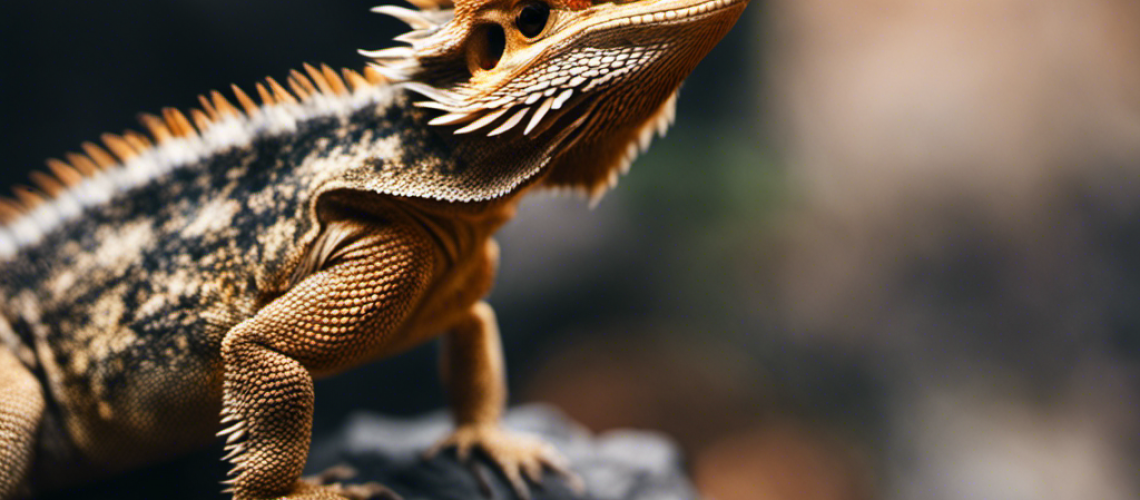Bearded dragons are semi-arboreal lizards that have become increasingly popular as pets. They can be a joy to own, but it is important to recognize and understand their behavior patterns in order to provide the best care possible.
This article will discuss seven common behavior patterns of bearded dragons, as well as when owners should be concerned enough to seek veterinary assistance.
Key Takeaways
- Basking, eating, socializing, and proper handling are normal behaviors of a bearded dragon.
- Unusual behaviors of a bearded dragon include playing instead of basking, lethargy and inactivity, refusing food and water, and difficulty moving or breathing.
- Signs of stress in a bearded dragon include decreased appetite, hiding for extended periods, hissing, erratic movements, and indication of illness or injury.
- Common health problems in a bearded dragon include respiratory infections, parasites, metabolic bone disease, dietary deficiencies, and improper care.
Normal Behaviors of a Bearded Dragon
The normal behaviors of a bearded dragon include basking, eating, and socializing. Handling Basics such as proper restraint and safe interactions is important for their health and wellbeing.
Environmental needs like temperature, humidity, and UVB/UVA lighting must also be met in order to provide the right atmosphere for your dragon to thrive.
Each behavior is essential to maintaining good health and understanding when something may be off can help identify problems before they become serious concerns.
Unusual Behaviors of a Bearded Dragon
Unusual activities may indicate underlying health issues in a reptile. Bearded dragons can exhibit behaviors that are different from their normal habits, such as:
- Playing instead of basking
- Becoming lethargic and inactive
- Refusing food and water
- Having difficulty moving or breathing
- Acting aggressively or displaying other signs of stress.
If any of these behaviors occur it is important to contact a veterinarian for further advice.
Signs of Stress in a Bearded Dragon
Signs of stress in a reptile can manifest as changes in activity and temperament. Inadequate diet, environmental changes, or other factors can all contribute to a bearded dragon’s anxiety.
Common signs include decreased appetite, hiding for extended periods of time, hissing, and erratic movements. If these behaviors are observed over an extended period, it may be indicative of more serious issues such as illness or injury.
It is important to monitor the health and behavior of your bearded dragon closely in order to recognize signs of stress early on and take appropriate action.
Common Health Problems in a Bearded Dragon
Common health problems experienced by reptiles such as bearded dragons include respiratory infections, parasites, and metabolic bone disease; all of which can be caused by dietary deficiencies, temperature changes, and improper care. These issues can be avoided with:
- Proper diet
- Regular vet check-ups
- Appropriate housing environment
- Timely vaccinations
- Adequate UVB exposure.
It is important to recognize the signs of stress in your bearded dragon so that any potential health problems can be addressed quickly.
When to Seek Veterinary Care for a Bearded Dragon
It is important to know when veterinary care should be sought for a bearded dragon in order to maintain their health. Proper dietary needs and enclosure setup are essential for optimal health, but even with the best of care there may be times when a visit to the vet is necessary.
If your bearded dragon has diarrhea, loss of appetite, unusual lethargy or any other signs of distress, it’s important to seek professional help as soon as possible in order to ensure your pet’s well-being. Other symptoms such as swollen eyes or mouth can also signify a medical issue that requires treatment from an experienced herp veterinarian.
Frequently Asked Questions
How Often Should I Feed My Bearded Dragon?
Bearded dragons should be fed daily with a quantity of food that is proportional to their size. Their diet should consist of a variety of insects and vegetables to ensure adequate nutrition. Variety and moderation are key for optimal health.
How Do I Set up the Proper Habitat for a Bearded Dragon?
Creating a suitable habitat for a bearded dragon requires setting up the proper lighting and UV exposure. A basking light, full-spectrum bulb, and some form of UV light are necessary to provide for the reptile’s needs. Careful placement of these lights will ensure adequate warmth and visibility.
What Are the Ideal Temperatures for a Bearded Dragon?
The ideal temperatures for housing a bearded dragon should include a warm side of 95°F and a cool side of 80°F, with temperature spikes reaching up to 105°F. These temperatures should be maintained to ensure the health and well-being of the reptile.
How Often Should I Bathe My Bearded Dragon?
Bathing a bearded dragon should be done on an occasional basis. The water temperature should be between 75-85°F (24-29°C). Bathing frequency can depend on the individual and its environment; it is recommended to bathe no more than once or twice a week.
What Type of Substrate Should I Use for My Bearded Dragon?
When selecting a substrate for your bearded dragon’s tank, consider the size of the tank and various bedding options. Popular choices include calcium sand, paper towel, reptile carpet, coconut husk fibers, and merculite. Each has its own unique benefits and drawbacks which should be researched before making a selection.
Conclusion
Bearded dragons are fascinating creatures that require vigilant care and observation to ensure they remain healthy and happy. Owners must be aware of normal behaviors, signs of stress, and common health problems so that they can recognize when something is wrong.
If any unusual behavior persists or if a dragon displays signs of distress, owners should seek veterinary care as soon as possible in order to provide the best possible care for their pet.
With the proper understanding and attention, bearded dragons can thrive in captivity.






